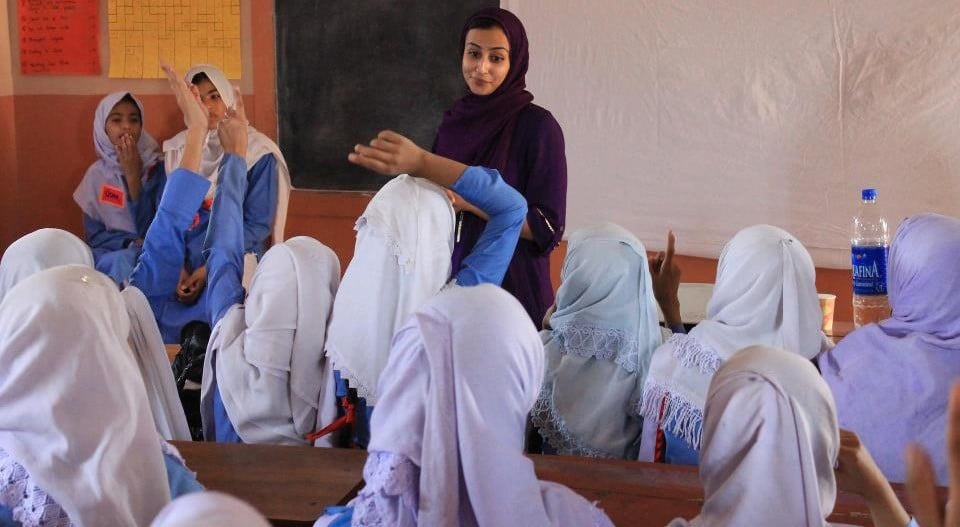
While the private schools’ contribution to education is commendable, the government has to take the responsibility of educating the masses

It is not that they do not dream of flying airplanes and wearing a doctor’s coat. They do. But circumstances don’t let them think of being anything more than mothers to their children, wives to their husbands and sisters to their brothers.
It is to dismiss largely this notion that Teach for Pakistan (TFP), a not for profit organisation that runs a government girls school in Sultanabad, held a career fair last year.
At the largely Pakhtun area in Karachi, these little girls squealed with delight as they met journalists, bankers, doctors and artists, all women -- who made them believe that they too could achieve much more.
"I want to be a lawyer," stated one little girl, "because I want to fight for the rights of the under-privileged. Or maybe I should be a journalist," she mused.
The event was arranged by fellows of TFP, young girls who had just graduated from top of the line universities, like the Lahore University of Management Sciences and the Institute of Business Administration.
They had enrolled in a competitive recruitment programme after they graduated to become part of the TFP, a global organisation which follows an interesting model.
They recruit top talent in the country to teach at underprivileged schools for two years -- the duration of the fellowship. In return they pay them a monthly salary which is as good as an entry level employee would get in the private sector.
For now it is running successful programmes in Lahore and Karachi and its fellows work in 29 schools. Altogether they claim to have improved the lives of 7000 students.
For many the experience has been an inspiring road to self discovery. Zehra Ali, an IBA graduate and TFP fellow who teaches at a school at Kala Pul in Karachi, says that she had done internships at two multi-national companies. "The experience did not go well with me. I felt there were robots around me who worked to achieve goals which did not make sense to me," she said.
"When I joined TFP I could see my children make progress gradually. And the experience was endearing."
She explains that when she first started teaching grade five, the children had no reading skills, in English or Urdu. But through innovative ideas like telling stories to her class which has now been promoted to grade six, they can easily read and comprehend sentences in both languages.
"That feels like an achievement," she says.
She explains that she also trains teachers who are already employed by the school. "They showed resistance to change initially. But we were very friendly and now they too implement innovative teaching methods."
In Pakistan, where you are born pretty much determines your place in the socio-economic ladder. According to a study by Alif Ailaan, a child from a poor family is six times more likely to never go to a school compared to a child from an affluent family.
TFP is trying in its small capacity to change this very status quo. "We try to manage checks and balances at schools, manage its finance and accounts, and give them a system through which they can run their schools effectively, even after we leave," said Maheen Saeed, Academic Manager at TFP.
While such innovative models brought in by the private sector are commendable they do not make much difference to the larger education woes of the country where 25 million children are out of school, educationists and policy makers argue.
"Though the private sector is doing great work when it comes to educating the underprivileged, it can never fill the void left by the government," said Ahmed Ali, lead researcher for Institute of Social and Policy Sciences, a think tank based in Islamabad.
He calls initiatives like the TFP, "small islands of success". "The government has the larger picture when it comes to education statistics in the country. They need to pull up their act."
He criticised the school adoption policy run by the Punjab government where adoption details lie with the DCOs of each province. "The DCOs get transferred on a regular basis. When a new DCO takes office he has no idea who the adopters are," he said.
Ghulam Rasool, an official at the Reform Support Unit -- where policies are devised for the Sindh Education Department -- said that when public schools and low-cost private schools are compared there are huge differences in learning outcomes. "Despite having lower salary structures for teachers low-cost private schools perform better."
But he maintains that not-for-profits or low-cost private schools can never fill the massive gap left by the government. "Public schools have better infrastructure and educated teachers -- if they only pay attention to governance, education woes of the country might be addressed."
Only in Sindh, there are 45,000 public schools. Many of them deal with teacher absenteeism and dismal learning rates. Having said that, a successful initiative like The Citizen Foundation -- a not-for-profit organisation which aims to teach the underprivileged, and which has in the past been able to send a student to Harvard University -- has only been able to construct 1000 schools all over Pakistan in 17 years.
The limited resources which the private sector has can never replace the duty of the state which promises free and compulsory education to all children aged between five and 16.
"There is no second option -- the government has to take responsibility of educating its children," said Ali.